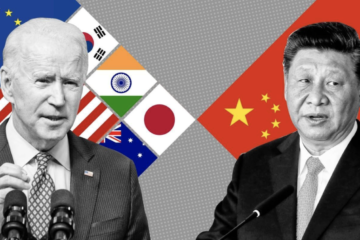“The voice of the Yangtze is heard on the Volga, The Chinese see the brightness of the Kremlin, We are not afraid of a military storm” – ‘Russian and Chinese Brothers forever’ written to commemorate Sino-Soviet relations during the Maoist era
The relationship between Russia and China during the 20th century faced severe ups and downs. Cooperation and discord were determined entirely by the political stance of the authoritative leadership and as a result, throughout the Cold War, the two were at odds with each other more often than not. The 21st century regimes have however made a complete U-turn and opted for a partnership instead. One must look no further than the relationship of the state leaders: in 2018 President Xi Jinping awarded President Putin a friendship medal, the highest honour awarded to foreigners. Putin for his part often speaks fondly of President Xi, stating that he is the only head of state to have ever celebrated his birthday with him. Yet this ‘bromance’ isn’t entirely generated out of mutual admiration. It is very much a part of a long-term strategy.
Economically, a partnership is advantageous; China is a country with a large manufacturing sector and a booming economy but scarce in natural resources relative to its increasing demands; estimates predict it will account for 40% of global gas demand by 2024. Russia, on the other hand, is blessed with an abundance of natural resources but is lacking in manufacturing. Basic economics urges specialisation in comparative advantage in order to trade, and listen they have. A pipeline named “The Power of Siberia” was completed in 2019 which runs from East Russia to China over a distance of 3000 km supplying China with vast quantities gas. In total Gazprom, Russia’s state-owned gas company, supplies China with a quantity of gas rivalling that of Brazil’s entire annual consumption. In return, Chinese direct investment to Russia rose by 72% in 2017. Even the critically acclaimed Chinese 5G network is being readily installed throughout the country. All this has led to Russia becoming China’s 9th largest trading partner. Economically, the partnership seems mutually beneficial as Xi Jinping stated referring the Power of Siberia: “an example of deep integration and mutually beneficial cooperation”

“The enemy of my enemy is my friend”?
Does the ancient proverb hold true with these colossal states in world politics? At first glance the answer would indicate a firm yes. Both states are on the security council in the UN and vote similarly on issues ranging from Venezuela to military AI, often directly contradicting the West. The 2014 annexation of Crimea isolated Russia from European nations, which levied sanctions which persist nearly 6 years later on. China likewise has been heavily criticised, again by the West, for building artificial islands in the South China Sea in order to stake its claims on the territory. The U.S trade-war under the Trump administration has only added fuel to the flames. The actions of the West have brought Russia and China closer together. Naturally in the face of a common adversary, military cooperation has been on the rise in the past decade. In 2014, a 3-billion-dollar armament contract was signed between Moscow and Beijing for the sale of the Russian S400 air-defence system. In September 2018, China, Russia and Mongolia participated in a joint war-game exercise in the Far-East of Russia. These war games were the largest staged since the Cold War, over 40 years prior. The number of troops and military hardware committed were on a scale unseen since the Second World War. This blatant flexing of muscles is supposed to show military prowess and unison against the West. Upon closer inspection, however, things aren’t so black and white. The number of Russian troops present was 300,000 whereas China only sent 3200. Then there is the fact that, although many military deals have been made between the two, they still fail to share a common nuclear defence system. Russia also refuses to sell their most advanced military hardware. This hints at a clear message: China and Russia do not fully trust one other.
Putin, for his part, would be foolish to trust China as their goals differ on most things other than confronting the West. Their policies in the Central Asian region best exemplify this. Russia has bases in most of the Central Asian states and previously held a monopoly over energy exports from the landlocked region, which it considers its ‘backyard’. The Belt and Road initiative has changed this and allowed Central Asia to gradually slip from the bears iron grip. Funds have flowed towards infrastructure projects in order to improve roads, railways and airports and a gas pipeline opened in 2009 from Kazakhstan towards China. Beijing has every interest in securing a pro-Beijing Muslim periphery so as to discourage any solidarity with its own Muslim province of Xinjiang. Russia’s annexation of Crimea also created anxiety, especially in Kazakhstan, of similar events transpiring. If Moscow wishes to hold onto its Asian sphere of influence it will need to rapidly introduce a friendlier foreign policy, but even that may be too little too late to counteract China’s economic prowess and ambitions. This partnership of convenience is thus becoming one-sided and as China grows and Russia stagnates, Beijing will be the one who calls the shots.

Opportunities for the West
The West could stand to gain from this unequal partnership. Isolating Russia with sanctions is dangerous as it pushes it further into the Chinese sphere. Yet there may soon come a time when Moscow chooses to look to the West again, perhaps under a different leader as has happened in the past. Creating a dialogue gives it an out if relations with Beijing sour. The Russia-China war-games in Siberia were a clear message, and the West would be wise to do all it can to exploit the couple’s weaknesses to its advantage before it is too late.


